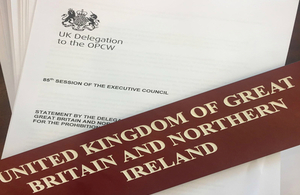85th Session of the OPCW Executive Council
Statement by the UK Delegation to the Organisation for the Prohibition of Chemical Weapons at its Eighty-Fifth Session.

Thank you Mr Chair,
The United Kingdom supports the statement made by the Ambassador of Estonia on behalf of the European Union. I would like to add a few additional remarks.
Mr Chair,
Last week at the 55th Meeting of the Executive Council we discussed the comprehensive and thorough reports from the Fact Finding Mission (FFM) on its investigations into a chemical weapons attack using sarin at Khan Shaykhun on 4 April 2017 and the exposure to sulphur mustard at Um Housh in September 2016.
All those who spoke at the Executive Council Meeting on 5 July condemned the use of chemical weapons, by anyone, anywhere, and all of us called for perpetrators to be brought to justice. The work on those investigations has now rightly passed to the OPCW/UN Joint Investigative Mechanism (JIM) to identify those responsible for perpetrating such heinous acts.
This organisation’s Syria file remains a cause for serious concern. We noted from the Fact Finding Mission’s presentation at last week’s Executive Council meeting that there have been more than 60 additional alleged incidents of chemical weapons use in Syria on the FFM’s case files since December 2015. Chemical weapons use undermines the global norm, is illegal and must stop. We welcome the FFM’s commitment to conduct further investigations into these allegations and we hope that they will report their progress to this Council swiftly.
The Director General has also reported to this Executive Council that, despite the best efforts of his Secretariat, no meaningful progress has been made on the range of serious outstanding issues identified in the Declaration Assessment Team’s last substantive report of July 2016. This is unacceptable. The Syrian Government has failed either to provide the documents that have been requested, or to make available key personnel for interview, or to account adequately for its chemical weapons programme, changing its story each time to fit the facts as they are established by the OPCW. This failure exposes the same obfuscation that we have seen from Syria in its dealings with the FFM and with the JIM.
The United Kingdom supports the declaration circulated by France and Germany entitled “Atrocities in Syria : Declaration on the FFM Reports Concluding that sarin and sulphur mustard have been used in the Syrian Arab Republic”. It is regrettable, but essential, that this Council continues to shine a special light on the situation in the Syrian Arab Republic. This Council must remain seized of it until all outstanding issues surrounding Syria’s Declaration have been answered in full, the Syrian Arab Republic has permanently ended its use of chemical weapons, and all of Syria’s remaining stocks have been disclosed and destroyed.
Last summer, this Council approved the Government of Iraq’s plan to destroy its remaining legacy stocks at the Al Muthana chemical weapons complex. We welcome the progress that Iraq has since made to encapsulate storage bunkers and put its legacy chemical weapons stocks irreversibly beyond use. We note with deep concern continued reports of chemical weapons use in Iraq, reportedly by terrorist organisations. We welcome the support that the Technical Secretariat continues to provide to the Iraqi authorities and we encourage Iraq to keep this Executive Council informed of their investigations into the attacks, and their work to hold the perpetrators to account.
These continuing worrying reports of chemical weapons use by Daesh serve to underline again why it is so important that the international community works together to defeat this terrorist group once and for all. It also shows why we must continue our efforts to prevent Da’esh and other non-state actors from acquiring or using chemical weapons. There are a number of further practical steps that the OPCW and all States Parties could take to tackle the chemical terrorism threat. The United Kingdom is pleased to support the draft Decision on Non-State Actors, as proposed by the United States and Germany. Based on the work of the Sub Working Group on Non State Actors, the Decision sets out measures that will demonstrate further this Organisation’s commitment to support states to address the chemical terrorism threat. We urge other Members of the Council to support this important Decision.
Mr Chair,
We thank the Director-General for presenting his draft Programme and Budget for 2018, and look forward to the forthcoming consultations. This Organisation can only operate effectively if States Parties meet their funding obligations in full. We call on all those States Parties in arrears of payment of their assessed contributions and other outstanding debts to the Organisation to make those payments. By not doing so, they cause significant risk and uncertainty to the financial stability and effectiveness of the OPCW.
Mr Chair,
The twentieth anniversary of the Chemical Weapons Convention that we mark this year rightly celebrates significant achievements in our common drive to rid the world of chemical weapons. We were delighted that our Director General was able to give a keynote address at the UK’s Demilitarisation Conference in May, also in its twentieth year. But recent events, including in Syria, remind us of the serious challenges we face to complete the task.
Director General,
The Executive Council will start the process this week to identify a worthy successor to follow in your stead. You will leave remarkably big shoes to fill. We are pleased that you will lead this Organisation for another year in its vital work. We hope that the process to identify your successor will be conducted with openness and transparency. Those not present in The Hague, both States Parties, and the people of our countries that we here all serve to represent, must have confidence that we are fulfilling our mandate appropriately and in the best interests of the Convention.
Thank you, Mr Chair